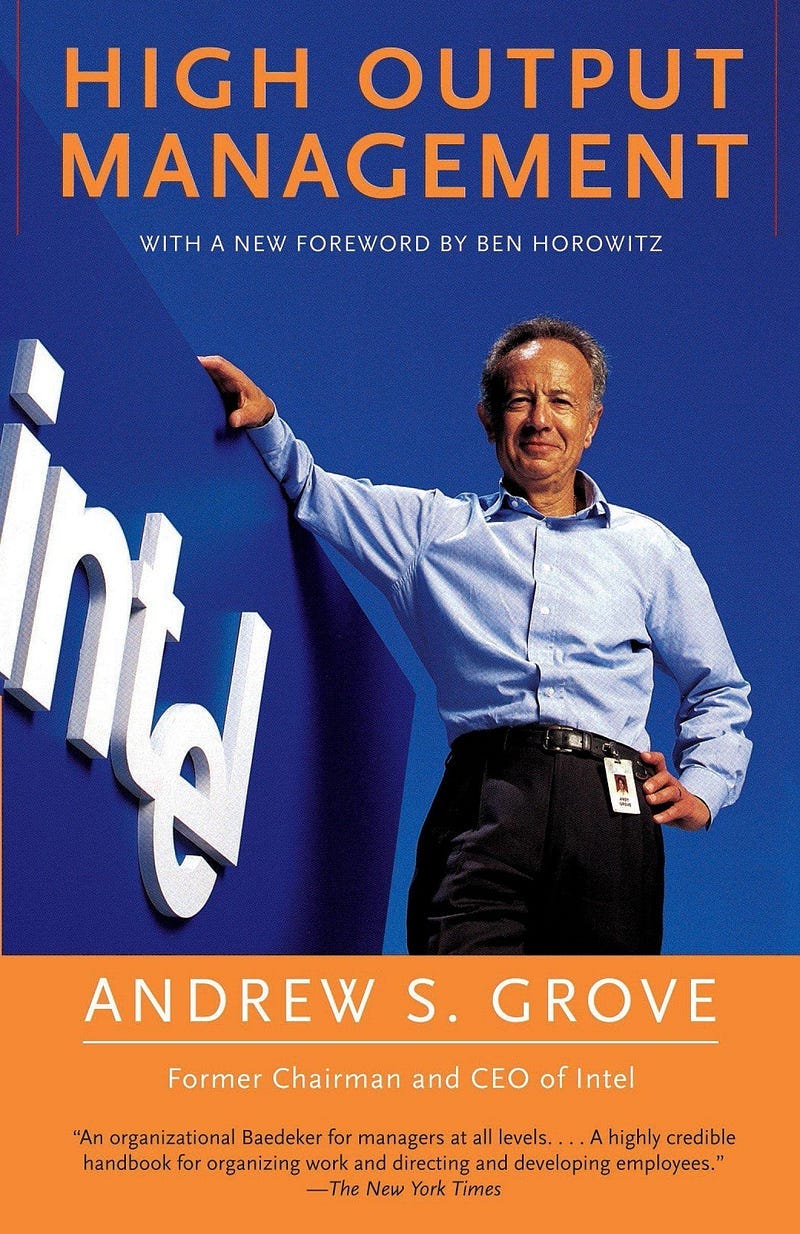9 Books All Engineering Managers Should Read
Whether a first-timer or you want to gain some different perspectives, these are the books I’ve found most helpful so far in my career
Whether a first-timer or you want to gain some different perspectives, these are the books I’ve found most helpful so far in my career

1. High Output Management
A manager’s output is the output of the organization under their supervision or influence.
Andrew S. Grove focuses repeatedly on this adage throughout his book. Looking at projects, bottlenecks, and creating a “breakfast factory” to drive points home, “High Output Management” was one of the first management books I read. While some of it seems archaic (there are discussions about properly telecommuting), it will always be a solid base for new managers.
Grove’s book can feel a bit dense, but the manufacturing management insights are a pre-MBA must. It’s been nearly 40 years since the book was written, but Andy Grove, sometimes called “the father of OKRs” has a lot of nuggets of wisdom to dole out. There’s even a section on “meetings” and how to get the most out of them. See the diagram below.
2. An Elegant Puzzle
Layed out almost like a Readme, Will Larson’s book on engineering management is a solid reference after its first readthrough. Doing something with hiring? Read that section again. What “High Output Management” was to management in general, “An Elegant Puzzle” is the software engineering management equal.
A great management book especially for the more technical-minded, Larson is methodical in his approach to nearly every management situation. Similar to “Principles” below, this is a management book I use as a reference guide, especially when approached with new problems.
3. The First 90 Days — Michael Watkins
Even if you are promoted into management within your current company, The First 90 Days can be extremely helpful for setting yourself up for success. I’ve read or listened to this book at least twice at this point as I’ve switched jobs and it is still extremely helpful.
It may seem obvious to create a 90-day roadmap for yourself, but The First 90 Days walks you through what you should hone in on, what you should evaluate, and how to assess your surroundings.
If you’re interviewing, ask your potential employer what they would expect from you in your first 90 days. They may not have a complete answer, but it will give you insight into how to meet expectations with your new direct team, your new peers, and the company as a whole.
4. Principles — Ray Dalio
Ray Dalio’s classic is less of a “cover to cover” book and more of a reference for any and all situations. For example, Chapter 5, “Learn How to Make Decisions Effectively,” takes a systematic approach to solving many management problems, especially those that have no quantitative data.
5.1 Recognize that 1) the biggest threat to good decision making is harmful emotions, and 2) decision making is a two-step process (first learning and then deciding).
He’s got a phone app and posts a principle almost every day on LinkedIn, so there are plenty of ways to consume this information, but my recommendation would be to start slow. Examine the table of contents from Part III, Work Principles:
To get the culture right…
Trust in radical truth and radical transparency
Cultivate meaningful work and meaningful relationships
Create a culture in which it is okay to make mistakes and unacceptable not to learn from them
…
Perceive and don’t tolerate problems
Diagnose problems to get at their roots
Design improvements to your machine to get around your problems
Do what you set out to do
Use tools and protocols to shape how work is done
That’s just a sample of the principles in the Work Principles section of the book. As I said, there’s a lot in there, some of which you may not have considered yet as a new manager.
5. Radical Candor
Speaking of being radical, the concept of Radical Candor is to “care personally and challenge directly.” That is the mantra throughout the entirety of Kim Scott’s book on how to “how to be a kick-ass boss without losing your humanity.”
This is your guide to learning to give feedback in all directions, regardless of who you manage or who exists in your peer group.
Be as specific and thorough with praise as with criticism. Go deep into the details.
Scott goes into further detail on the “atomic building block” of management, Guidance, in Chapter 6. Radical Candor is also a rare book that starts to dive into Skip Level 1:1s, a subject that is rarely discussed as a tool for managers of managers.
Kim Scott also calls out what Ben Horowitz dubbed the “sh*t sandwich,” in which you hide the feedback you’d like to give someone in between two positive items. Some see it as a compliment sandwich, others as the “sh*t sandwich.” Which sandwich do you see?
The notion of a ‘right’ ratio between praise and criticism is dangerous because it can lead you to say things that are unnatural, insincere, or just plain ridiculous.
6. Measure What Matters
John Doerr is sometimes talked about as the Godfather of OKRs and his book “Measure What Matters” begins to lay out his perspectives on setting goals at an organizational and team level.
Cutting goal-setting in a few different ways, Doerr notes a dual cadence (yearly for the org, quarterly for teams), and says:
High-functioning teams thrive on a creative tension between top-down and bottom-up goal setting.
A word of warning, OKRs will not go well the first time you create them. It will be a struggle and it may feel pointless. Work to ensure there are no conflicting OKRs between disciplines and sectors of your company and work across the board to leverage each other. Together you can all create awesome objectives and key results.
7. The Lean Product Playbook
Cutting my teeth at an agency, I wasn’t able to verbalize how I was getting to an MVP on projects. The Lean Product Playbook was able to put into words a lot of my thoughts and helped further cement how I approach projects.
It’s important to remember that you cannot take a framework and apply it directly in all companies, but the Lean Product Playbook dips into how to approach the following:
Determining your target customers
Identifying underserved customer needs
Creating a winning product strategy
Deciding on your Minimum Viable Product (MVP)
Designing your MVP prototype
Testing your MVP with customers
Iterating rapidly to achieve product-market fit
If you’re a more product-focused manager or want to have some say in the direction your product is going, get comfortable with chipping away big ideas until you get to the MVP.
8. Organizational Behavior: Theory and Practice
Not a light read, Organizational Behavior is a textbook I read while obtaining my MBA. Prior to it, I’d never thought about organizations as being able to be studied in such a large capacity.
Covering topics like fear of change, job design, how organizations deal with behavioral problems, and how to structure your organization, this textbook is another reference-style book for your early career. Denser than Osmium in some sections, take your time with this book, but pay close attention to the core concepts.
9. Emotional Intelligence: Why It Can Matter More Than IQ
More often than not, companies are looking for leaders with high EQ (emotional quotient aka emotional intelligence). If you can’t relate or empathize with your direct reports, it will be difficult to lead them. Daniel Goleman is an expert in the EQ field and while teaching empathy can be extremely difficult, this book gives you a roadmap of how to start on your EQ journey.
Other Books I Haven’t Read But Are On My List
The Manager’s Path — Camille Fournier
The Making of a Manager — Julie Zhuo
Staff Engineer — Will Larson
How about you, what are some of the books that have helped form your management style? There are many books out there so I’m curious to see what others have found helpful over their time in management.
Thanks for reading.





